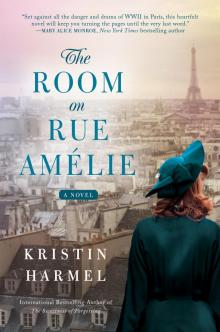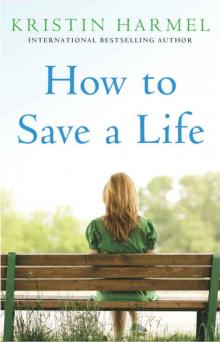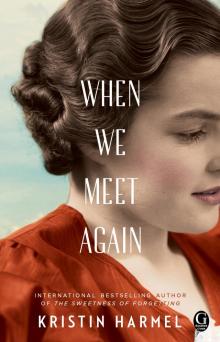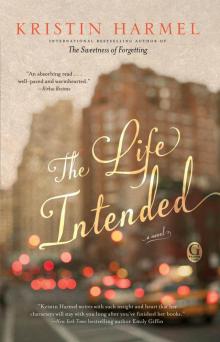- Home
- Kristin Harmel
When We Meet Again Page 3
When We Meet Again Read online
Page 3
Perhaps feeling attention upon her, she turned in Peter’s direction, and their eyes met. She didn’t blink, and neither did he. Instead, they held each other’s gaze for a long moment, both of them motionless, as if life had simply frozen in place. Or maybe, Peter would think as he replayed it in his head later, it was his imagination. Maybe she hadn’t stopped at all. Maybe she hadn’t even noticed him.
But she had. He knew she had. She finally looked away and began walking again, leading the others, who seemed younger than she. He watched her as she paused to let them go ahead of her, into another maze of sugarcane. And then, just when he thought he would lose her forever, she turned, looking over her shoulder for just a moment. Their eyes met again, and it was enough to make Peter feel buoyant and hopeful as she walked on, vanishing into the field.
* * *
He dreamt of her that night, the girl in the red dress. It was strange, actually—not just the fact that he was seeing her in his dreams, but also the idea that for the first time in almost a year and a half, his slumber was sweet and peaceful rather than restless and troubled. Since that terrible night in the African desert, the night his best friend, Otto, had died in his arms, he hadn’t slept without dreaming fitfully of blood and death.
Peter had been part of the Afrika Korps, and though he’d heard terrible things about the conditions for Hitler’s armies marching across Europe, he couldn’t imagine things being much worse than they were for him and his fellow soldiers. The sand was everywhere, endless, stinging, vicious, and there were some days when Peter couldn’t remember the last time he’d taken a sip of water. They had followed General Rommel there, but then Rommel had returned abruptly to Germany in March of 1943, saying he needed to convince the führer of the severity of the situation on the African front. But he hadn’t returned, and everything had deteriorated. General von Arnim and the Italian, General Messe, had taken over Rommel’s command, and it hadn’t taken long for Peter to understand that the men didn’t know what they were doing.
Otto had died there, and Peter could never forgive the forces that had conspired to make such a tragedy occur. Otto had grown up just down the lane from Peter’s family, and the two had been like brothers since they were three years old. They’d been just a month apart in age, and even with the German economy collapsing around them, they’d used their imaginations to conjure an embarrassment of riches when they were boys. They were always hunting treasure, imagining themselves to be great adventurers at sea, and they had made a pact when they were ten years old that one day, they would explore the world together. They’d only been eleven when Hitler had begun his rise to power, and they’d been alone in their dislike of the man, whom they both secretly agreed resembled a rodentlike pirate named Ratte from a chapter book they had read the previous summer. But it seemed that all Germany was in love with Hitler, especially the families of both boys, and so they had to escape to their tree house in the woods in order to whisper made-up tales of the dastardly Pirate Ratte who had fooled the country into believing he was their savior.
A decade later, no longer boys but men, Otto and Peter found themselves in a sandy, arid alternate universe, fighting for a cause they didn’t believe in. “You know, Peter,” Otto had said with a smile the night he died, “this isn’t what I meant when we were children and I said we should explore the world.”
Peter had laughed, despite his hunger, despite his thirst, despite the fact that death lurked everywhere in this endless desert. “You were not dreaming of fighting a war in Africa?”
“I rather think we should go to America when this thing is over,” Otto replied.
Peter raised an eyebrow. “America, you say? But they hate us. They have come all the way across an ocean to wage a war against us.”
“Can you blame them?” Otto grumbled. “No matter. After the war, you and I will be great ambassadors for Germany. We will show them that not all Germans are like the rat pirate.”
Peter laughed, thinking that his friend’s words were absurd. America! He couldn’t imagine. “You have always been a big dreamer, my friend. Now get some sleep, or we will never be up to the march tomorrow.”
Two hours later, something jarred Peter out of a deep slumber. He immediately sprang from his bedroll into a crouching position, ready to fight an invisible enemy. But the night was silent, and after a long moment of holding his breath, Peter looked up toward the sky and realized instantly what had awoken him. The blackness was alive with dozens of dancing pinpoints of brilliant light. “Mein Gott,” he murmured to himself, sinking back down into a squat. It was important to stay low to the ground here, for one never knew when the enemy was lurking. “A miracle.”
And though the scientific side of his brain realized that the dazzling streaks across the darkness were the result of a meteor shower, the romantic in him knew it was much more than that. Here, in the middle of hell, he was seeing heaven.
“Otto!” he whispered, shaking his friend awake. “Quickly, come see!” He pointed upward, and Otto, still rubbing the sleep from his eyes, followed his friend’s gaze and gasped.
“It’s amazing, Peter,” Otto replied, staring upward, his jaw slack. “Which way is north?”
Peter pointed to his left, ninety degrees from where the half-moon dangled in the sky. “I think it’s that way.”
Otto stood and peered into the blackness. All around him, stars continued to streak through the night. “I can almost see Germany, Peter,” he said. “Look, the stars are showing us the way home.”
“Sit down, friend,” Peter said with a laugh, “before you make yourself a target.”
No sooner were the words out of Peter’s mouth than the world exploded, a hailstorm of bullets whizzing and careening through their encampment like a swarm of drunken bumblebees. “Otto!” Peter screamed. “Get down!”
But there was no answer from his friend, and while the encampment came alive around him, and the night filled with smoke that obscured the brilliant stars, Peter fell to his knees and groped around for Otto. He’d been only a foot away. Where had he gone? “Otto? Otto, where are you?” Then, Peter’s hand landed on something warm and wet, and in a split second, he realized it was Otto’s shoulder. “Otto!” he cried.
He bent to his friend, and as bullets continued to slice through the air and the Germans returned fire, he struggled to find Otto’s pulse. But he found only an oozing hole the size of a chestnut in his friend’s neck, and when he pulled away in horror, he was covered in blood.
“Otto?” he whispered. But it was already too late. Otto’s eyes were wide and motionless, staring up at the endless sky as if he could see through the haze of smoke and horror to the heavens above, to the beautiful streaking stars. “No, my friend! No.”
But there was no answer.
“Come on, Dahler!” someone yelled in the chaos.
“I can’t leave him!” Peter screamed, trying to lift Otto’s limp body from the wet ground as bullets whizzed all around them.
“He’s dead!” yelled another voice. “Put him down or you’ll die too!”
Peter managed to carry Otto fifty yards across the camp before two soldiers materialized beside him, forcing him to release Otto and dragging Peter to safety against his will. He had never forgiven himself for leaving his friend alone in a bed of blood and sand. Nor had he forgiven the fact that he’d been the one to cause Otto’s death. If he hadn’t woken him to see the meteor shower, his friend would still be alive.
A mere two months later, the war ended for Peter.
The night he was captured, he had dozed off, raw from exhaustion and thirst, in a shallow ditch he’d dug with his bare hands. When he’d awoken, the Allies were upon them. Their commander was speaking, telling the troops that it was time to surrender to the Americans. And as Peter put his hands in the air, he felt an overwhelming sense of shame. But the shame wasn’t for the loss in battle, for the defeat inherent in surrender. It was for the relief he felt that his war was finally over.
* * *
For more than a year now, Peter had wondered what it all meant, what God’s purpose was in delivering him from Africa to this endless expanse of sugarcane in the Florida heat. He had traded the arid desert for the humid swamplands, the continent of Africa for the continent of North America, both terribly far from the land of his birth. He’d felt homesick at first, but gradually, the good cheer of the American guards and the bounty of the land had grown on him. Otto had been right all along about this place.
Now, as Peter woke with the image of the girl in the red dress fresh in his mind, he wondered fleetingly if perhaps everything had been leading to this. The terror of war, the despair of capture, the exhaustion of labor: perhaps she was the reason.
But it was crazy to think like that. He didn’t know her. They’d never spoken. He had no idea how old she was, or whether she was already married, or if she hated Germans on sight like so many Americans seemed to.
But in the dream, which he could still see on the back of his eyelids, she had been smiling at him. Smiling and beckoning. And even now, in the clear light of day, he wanted nothing more than to follow.
CHAPTER FOUR
* * *
I’ve been thinking,” my father said when he called the following Monday morning, “that I might have a lead for you.”
The painting was still propped up on my kitchen table, and I’d spent the last four days alternately staring at it and searching the Internet for anything I could find about my grandmother. She’d died in February at the age of eighty-eight, and before that, she’d lived a relatively quiet, solitary life. The only mentions of her I could find in newspaper archives were her obituary and an article from 1964 in which she’d been interviewed by a reporter while dropping her son, Victor—my father—off for his first day of college at Yale. I had tried searching for her name along with the terms Munich, Germany, and painting too, just in case something popped, but the results were meaningless. I’d gotten sidetracked yesterday with a new freelance assignment from Seventeen, so I’d been busy, but the mystery of the painting’s origin was still weighing on my mind.
“A lead?” I asked skeptically.
“Yes. I can’t believe I didn’t think of it sooner. When my assistant was organizing your grandmother’s memorial service, she called everyone in your grandmother’s address book. One of the people who came up for the service was a man your grandmother had grown up with. He introduced himself at the funeral, but I didn’t get the chance to talk with him.”
“I don’t understand.” I knew very little about my grandmother’s past; she had been born in 1926 and raised on a farm somewhere in South Florida, but she’d cut ties with her family after leaving home, and she’d never spoken of the years before she gave birth to my father in early 1946. “I thought she had completely walked away from that part of her past.”
“I thought so too. But this man, Jeremiah Beltrain, told my assistant they’d called each other over the years here and there. In fact, he said he was around a lot when I was a kid, although I don’t remember him.”
“Your middle name is Jeremiah. Did Grandma Margaret name you after him?”
“No idea. I’d never heard of him before.” He paused. “I’m thinking now that he might know something about your grandmother’s past. It’s a place to start, anyhow. If I give you his information, will you tell me what you find out?”
“Okay.” I jotted down the number my father gave me and thanked him, although I hung up wondering why he hadn’t thought to call the man sooner, before the painting had arrived. Wouldn’t he have wanted to know more about his mother’s background? I certainly did. But that was the difference between my father and me. To me, family meant something.
Before calling, I searched for Jeremiah Beltrain on the Internet; I preferred to go into cold calls with as much prior knowledge as possible. But there was very little to be found. He was mentioned only in a 2006 article in the Palm Beach Post about independent sugarcane farming, and the newspaper identified him as a seventy-four-year-old longtime farmer in a town called Belle Creek. I did the math and realized he must be eighty-three now—six years younger than my grandmother would be if she were still alive. So if they’d grown up together, their age difference would have been significant. I wondered how they knew each other.
I picked up my phone, dialed the number my father had given me, and waited through three rings.
“Hello?” A man answered just as I was about to hang up. He sounded out of breath.
“Hi. I’m looking for Jeremiah Beltrain.”
“This is he. May I ask who’s calling?” His tone had taken on a suspicious edge.
“My name is Emily Emerson,” I began. “I’m—”
“Margaret’s granddaughter!” he interrupted. “Oh my. I was hoping I’d hear from you one day, dear. She was so proud of you.”
I didn’t say anything for a moment. I was startled that he’d known exactly who I was. “Thank you,” I said finally. “The two of you were friends?”
He chuckled. “I can’t remember a time before I knew your grandmother, Emily. She was a great woman.”
“Thank you. I think so too.” I took a deep breath. “The thing is, I’m calling today with a bit of a strange request. I just received a painting in the mail from an anonymous sender with a note saying that my grandfather never stopped loving my grandmother, that she was the love of his life.”
He drew in a sharp breath. “What?”
“It’s a painting of my grandmother. Or I think it is, anyhow. And I want to understand what the painting and the note mean, but I don’t know anything about her past. She never told us who my father’s father was; she always refused to speak of him.” I paused. “But my dad said you grew up with my grandmother. So I was wondering if maybe you know.”
There was a long moment of silence. “Well, I think that’s a story to be told in person, don’t you? Any chance you can make it down to Belle Creek? It’s a little postage stamp of a town on the southern edge of Lake Okeechobee. Should only take you a few hours to get here if you’re still living in Orlando.”
“How did you know I live in Orlando?”
“Your grandmother spoke of you often.” I could hear the smile in his voice. “Can you come to see me?”
I checked my watch. It was only ten in the morning. “How’s today? I can leave here in about an hour.”
“That sounds perfect. I think your grandmother wanted you to know the truth, my dear. But sometimes, when one is living with a broken heart, it’s too hard to give voice to the stories that hurt the most.”
He gave me his address and directions from the highway, and we hung up with a promise to see each other in a few hours.
* * *
After showering quickly and throwing on a sundress and some makeup, I took a few cell-phone pictures of the painting and headed for Belle Creek, a town I’d never heard of until today. The trip would snake me down the Florida Turnpike to U.S. 441, then across the state on State Road 78, cutting west toward Lake Okeechobee, a huge, shallow lake that looked on a map like a jagged O cut out of the southern half of our state.
As I took the I-4 exit for the Turnpike and headed south, the road opened up ahead of me, and my mind wandered. Was Belle Creek really my grandmother’s hometown? Why had she never mentioned it? And what would this man be able to tell me about her?
She had always been, to me, a woman of mystery. I’d never had any doubt that she loved me, but she wasn’t a person who told stories about her own life or wore her emotions on her sleeve. The secrets of her past were locked away so deep that I’d always assumed she never thought of them at all.
I’d spent a lot of time wishing I’d inherited that skill. To be able to lock the past away in a box, closing it off forever, sounded wonderful. There was nothing I wanted more than to forget everything that had taken place the year Catherine was born, but the more I tried to push it away, the more it haunted me. And now that she had just turned eighteen, I found myself th
inking about that year and everything that had happened a lot more frequently. In fact, I’d been having trouble sleeping, because all the things I’d tried so hard to forget were suddenly invading my dreams.
My mother had been killed in a car accident that March, just two and a half months before I graduated from high school. My father had left seven years earlier, but his mother, my grandma Margaret, had stayed in touch with my mother and me. She was as appalled by my father’s decisions as we were, and although she was still in contact with him, I knew that their relationship had gone cold. “I always thought I had instilled the right values in him,” she said to me one day when I was sixteen. “But in the end, he left just like his own father did. I’m so sorry that I raised a person who would hurt you that way, my dear. I’ll bear that guilt for the rest of my life.”
When I was thirteen, Grandma Margaret had moved from Atlanta to an apartment overlooking the bay in St. Petersburg, Florida, and I’d visited her each summer. When my mother died, Grandma Margaret came back to Atlanta to live with me while I completed school. She was the only person in the world who knew I was pregnant.
It had been a mistake, of course. When my mother was alive and life was good, I’d had a boyfriend named Nick. And I’d loved him. God, I’d loved him. We’d only been together for six months when my mother died and, devastated and reeling, I’d pulled back from everyone. My friends had faded after the first few weeks, but Nick stuck around. He was the only one who did, even when I pushed him away. I could see that now, but at the time, I hadn’t been able to see past what I’d come to believe was the looming, central fact of my life: the people who are supposed to love you will inevitably leave.
You can’t rely on anyone but yourself. That was my mantra, day after day, so when I discovered I was pregnant—exactly a month to the day after my mother died—I knew I couldn’t tell him. What if it made him hate me? Or worse, what if it made him stick by me solely out of pity, only to abandon me once the baby came? I couldn’t handle that.

 The Room on Rue Amélie
The Room on Rue Amélie The Winemaker's Wife
The Winemaker's Wife The Forest of Vanishing Stars
The Forest of Vanishing Stars The Book of Lost Names
The Book of Lost Names Italian for Beginners
Italian for Beginners After
After How to Save a Life
How to Save a Life The Blonde Theory
The Blonde Theory The Sweetness of Forgetting
The Sweetness of Forgetting When We Meet Again
When We Meet Again Life Intended (9781476754178)
Life Intended (9781476754178)